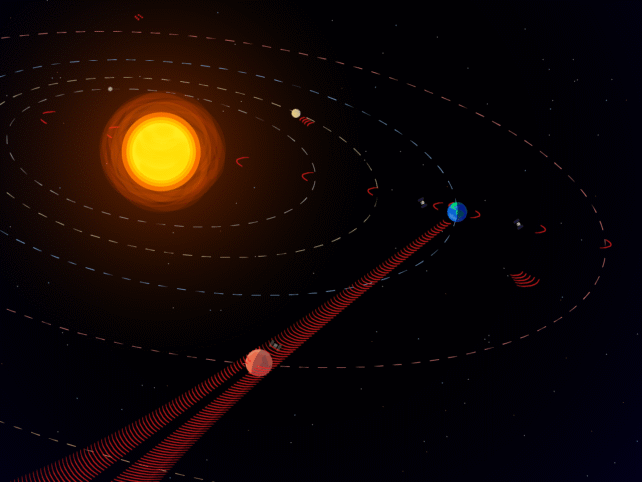Alien civilizations could eavesdrop on our communications with our spacecraft and rovers, according to a new study – and we might be able to find them the same way.
To tell a Mars rover to turn left or an orbiter to change focus, mission scientists have to beam powerful transmissions towards neighboring planets in our Solar System. Of course, the target doesn't 'catch' all of the radio waves sent in its direction, so some of the signal would continue into the cosmos, essentially indefinitely.
Anything in that ever-expanding line of radio waves, according to a new study by scientists at Pennsylvania State University and NASA's Jet Propulsion Laboratory, would be in a prime position to hear our calls.
Related: Your Next Flight Might Signal Our Existence to Alien Civilizations
"Based on data from the last 20 years, we found that if an extraterrestrial intelligence were in a location that could observe the alignment of Earth and Mars, there's a 77 percent chance that they would be in the path of one of our transmissions – orders of magnitude more likely than being in a random position at a random time," says Pinchen Fan, astronomer at Penn State.

The team examined decades of logs from NASA's Deep Space Network (DSN), which is used to communicate with spacecraft beyond the Earth-Moon system. Because our Solar System's planets orbit within a plane, aliens located in a place that lined up with that plane's edge would have the best chance of listening in, especially if they were within about 23 light-years of us.
The fun part is that we could flip this around and use it to look for aliens. If other intelligent civilizations are also exploring their neighboring planets, then our best bet for picking up radio signals could be by looking for nearby systems where two planets align from our point of view.
"However, because we are only starting to detect a lot of exoplanets in the last decade or two, we do not know many systems with two or more transiting exoplanets," says Fan.
"With the upcoming launch of NASA's Nancy Grace Roman Space Telescope, we expect to detect a hundred thousand previously undetected exoplanets, so our potential search area should increase greatly."
The research was published in the Astrophysical Journal Letters.
